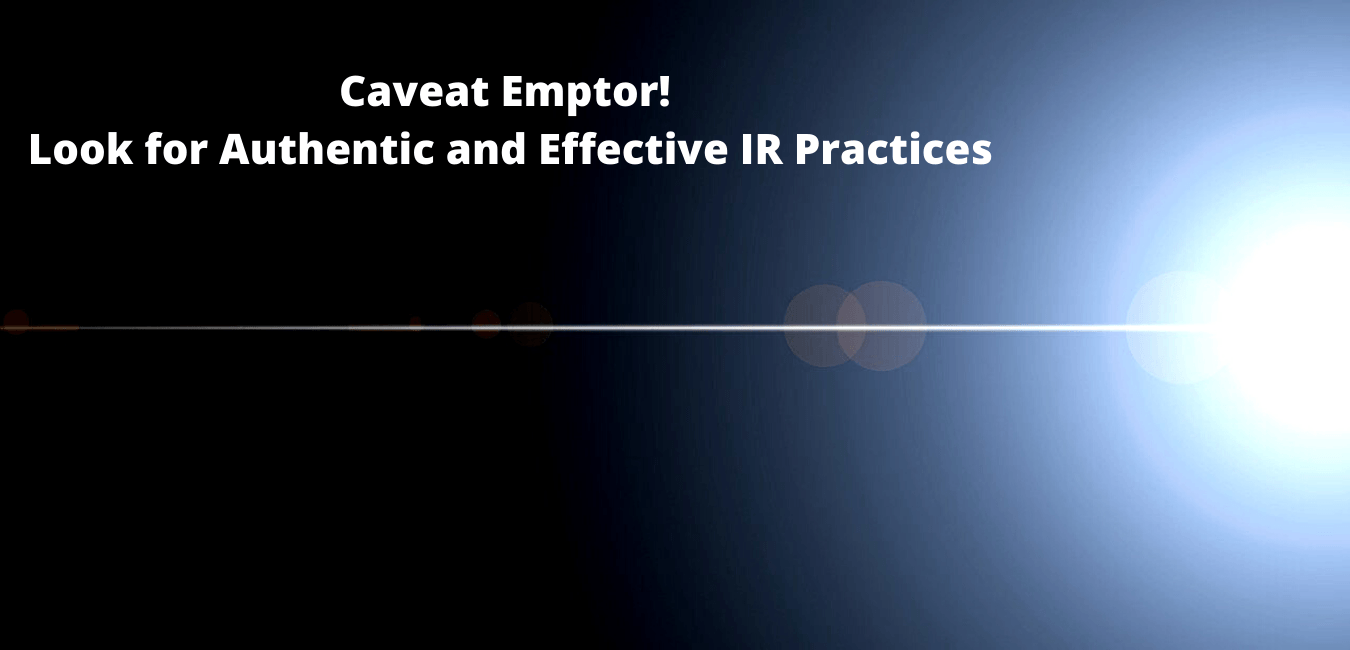In 2007 Investor Relations practices for public companies no longer requires decision-makers to choose a typical, cookie cutter style program. Today’s corporate communications landscape has been altered dramatically, as new media and alternative choices are readily available through specialized investor relation tools.
Public companies are expected to adapt and embrace such products or face being ignored in the capital markets. Those companies not grasping this reality may be viewed as dinosaurs by the investing market. As a direct result, public companies are now demanding that contemporary IR providers communicate the company message and the company brand — as opposed to a simple serving of communications activities.
“The company comes first” is the justifiable demand. And a “specialized IR firm” is the answer. It is important that your IR supplier be focused, dedicated and considered a consistent supplier of client-focused communications services and materials. Many are still unaware that the profession of Investor Relations has been utterly transformed from the broker/deal-maker that can work the phone in-house, disseminate mass emailing to thousands of unqualified targets, or offer overpriced videos and webcasts — and unscrupulous “IR firms” are taking the liberty of importing their logos front and centre.
Shareholders, management and capital market participants now demand and expect an assortment of electronic media, hard copy traditional materials and — let’s not forget –old fashioned face-to-face networking arrangements that, though often overlooked, nonetheless remain profoundly effective.
Tired and traditional, old-school investor relations providers frequently showcased their opulent offices, and in doing so recommended expensive, glossy annual reports, and coincidentally submitted routinely excessive expense accounts. This hoary model for yesterday’s investor relations firm is, though not yet extinct, on the endangered species list.
Sophisticated PDF and PowerPoint presentations, rented boardrooms and catering can still be effective when packaged properly. But professionally rendered websites and other related electronic media are now essential windows of information for shareholders, potential investors, and the all-important professionals in the financial services sector. Re-usable, modifiable communications materials that assist in getting your message communicated are no longer optional they are a minimum expectation of today’s new media audience – and indeed, the investment community (retail included).
The reality is that the vast majority of IR firms have been hired simply for the size of their rolodex or email list database. “Gone with 90 days notice” is a familiar mantra and an unfortunate reality. Client companies expect when hiring investor relations professionals that the result is about client contacts and garnering “eyeballs”. But it is not unusual for company management to legally terminate the IR contract and usually for the same reason: a disappointing lack of performance.
The company is forced to repeat these cycles, wasting valuable time and resources in engaging a new firm, once again seeking new contacts and a broader audience.
When public companies find themselves faced with this scenario and the “IR cycle” repeats itself, it is imperative the companies’ in-house messaging materials be of the highest quality or the new IR firm will seek to create new material…. The shocking reality is that many will actually try to brand their own business with your money!
Companies ought not to repeatedly pay for “must have” changes to documentation or websites that new IR firms insist upon in order to appear engaged or worthy of their monthly retainers. It’s “make work” for a fee and patently self-serving. Ensure your communication tools are reusable and easily modified, knowing you’re forging value and not taxing the treasury.
Whether you hire an IR investor firm for 6 weeks, 6 months, or 6 years the IR firm you engage to represent you as your eyes, ears and voice had better be telling your story the way that you want it told because you are ultimately responsible to your shareholders. Today’s IR suppliers need to adapt their materials and styles into your story and understand it is your program for their contacts… and not the other way around.
Imagine an IR firm that communicates only the client’s story with materials that brand the public company exclusively – and not their own firm. Why would a company pay to promote the brand of their retained service provider and have their story incorporated into the materials as an afterthought? Yet it happens with alarming regularity.
It is definitely prudent to place the company and its brand upfront while relegating the contractor’s presence to a mere footnote. Traditional IR contractors will be reluctant to accept or embrace such a common sense approach because they will realize that they will have to market their services on their own dime!
On the other hand, company specific materials allow the company to seamlessly change their IR program with minimal disruption. The company is properly in control.
The key is communications, materials and dialogue. Firstly, you should actually respect and enjoy the people you have chosen to work with. You must also have an informative, yet easy to navigate, and continually updated website. Companies need to create consistently branded email, newsletters, fact sheets, and other assorted hardcopy materials.
These must also be incorporated and carried forward in every aspect of the business — from how the phones are answered, to how quickly requests for information get out and how the company presents itself at trade shows or their annual general meetings. You need affordability and consistency. Slow and steady, maintain the course… and let the deal speak for itself by way of conservative, honest and consistent storytelling. An IR firm must tell your story your way while constantly relying upon an in-depth understanding of the management and their business model.
History has shown that traditional third party firms that were contracted for high fees, offering one-shot, massive saturation campaigns for short periods did not provide investor/shareholder/industry loyalty. Successful companies understand the message of branding and storytelling in virtual perpetuity. Relationships are essential and vital; in short, they are everything. Negotiate a longer term for fewer hours and get an IR firm that is prepared for the ups and downs of market conditions. Rain or shine, it’s all about the storytelling.
“They can’t buy your stock if they don’t know your story”.
With this in mind, the following eleven points may provide some assistance prior to engaging the services of an IR firm. Can the firm you are considering meet deadlines? Prove it. Can they provide a list of their last three clients’ references? Call them.
- What terms are they typically engaged for and have they ever experienced cancellation prior to a contract being fulfilled? Follow up.
- How long have they been in the business? How long have they been located in their place of business? How long have they had their current phone number? Confirm it.
- Is it a one-man shop? Is there any depth in the event of a sickness or holiday? Call and/or visit their office. Are the phones ringing? Are they working with other clients?
- How many names can they drop; do they really know the people they speak of? Where is their audience located? How do they communicate with their database?
- Check the performance of the latest companies they have been engaged with. Talk to the decision maker who hired them.
- How well do they know your deal after given the opportunity to quote? They do want your deal after all.
- Are their prices competitive? What are their hours of operation? Discuss compensation openly. Can they provide a reasonable audience for a reasonable fee?
- Are they good storytellers? Would you listen to their pitch? Ask and listen.
- Does the firm you are considering offer an all-inclusive, accountable style of doing business? They should be able to do it all in-house to give you the tools you need for success. If they can’t do it themselves they should be partnered so it is not your concern.
Al McLellan and Shaun Ruddy are the Managing Partners of www.RMC.mobi. They pride themselves on not being a typical, traditional investor relations boutique but a well organized, personality driven company that does it all in-house and takes responsibility for their actions. RMC is about “return on investment” and “shareholder value” for our clients provided via an award winning, one source, one responsibility style of doing business, says RMC.

Since 2005 ITB Solutions has provided listings development services to stock Exchanges in Canada such as the Canadian Securities Exchange. ITB Solutions currently provides New Listing Services to the NEO Exchange. We assist companies with the listing application and managing the process to become publicly tradable in Canada, as well as offering advice on how to make the most of your public listing. You can reach Jeffrey Stanger at 647-500-0492 or by email at jeffrey@itbsolutions.ca









